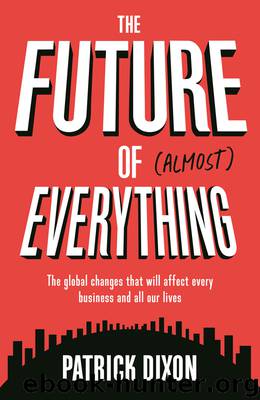The Future of Almost Everything by Patrick Dixon

Author:Patrick Dixon
Language: eng
Format: epub
Publisher: Profile
Future of India – growth of global services
India is a highly globalised nation of nations, the largest democracy on earth, and the third largest economy in the world in terms of PPP. India has a key advantage in international trade and service delivery because English is a national language, alongside Urdu and many other languages, unlike in China where English is hardly spoken.
Expect India’s economy to grow 5–7% on average over the next decade. However, just as China is becoming too expensive a location for many multinationals in terms of outsourcing manufacturing, India is becoming increasingly expensive for outsourcing of services. Salaries are rising 3–5 times faster for senior managers in some sectors than in Europe or America. And as in China, India’s long-term future will depend on growth of its own internal markets.
A single State, Andhra Pradesh, has over 200 million citizens, of which 75 million speak Telugu. Karnataka state has 52 million people, including Bangalore. The minister for health oversees no less than 114 medical and pharmaceutical colleges, while the minister for education has 15 universities, 131 engineering colleges and 600 industrial training institutions.
Young and highly ambitious, well-educated workforce
Half the population of 1.2 billion people are under 26, and this single fact will drive economic growth more than any other over the next 30 years. More than 66% of the national wealth is generated by India’s 646,000 towns and cities, and this will increase rapidly with the arrival from rural areas of a further 300 million people over the next 25 years. Population growth is also the reason why income per head has remained much lower than China, despite national economic growth – more wealth but more mouths to feed.
India’s central government will continue to exercise far less national power than in China, and this will mean fewer large-scale national programmes for energy, infrastructure, industrial parks, and so on.
However, India is a nation of industrious, well-educated and highly ambitious entrepreneurs, and is exceptionally well connected globally with hundreds of millions of people in its diaspora, often in highly influential roles across the world.
Despite outward signs of busy chaos, India will remain one of the best places in the world to make things happen fast. This is a country that is able to deliver from an empty concrete shell with no facilities a complete working call centre with trained staff and 24-hour video links to Europe, less than 12 weeks after signing a contract.
Religious caste and corruption in India
India will continue to be a highly tribal and religious society, with many internal tensions, particularly between the majority Hindu, Muslim, and to a lesser extent Christian, communities. Expect outbreaks of ethnic violence, triggered by accusations of favouritism by authorities to one group or another, particularly in periods leading up to elections. The caste barriers of India are becoming less severe, especially in cosmopolitan cities, but the whole caste system will look even stranger in future, in a global system that increasingly adopts human rights legislation.
Corruption will continue to hold India back, despite popular anger and calls for reform.
Download
This site does not store any files on its server. We only index and link to content provided by other sites. Please contact the content providers to delete copyright contents if any and email us, we'll remove relevant links or contents immediately.
International Integration of the Brazilian Economy by Elias C. Grivoyannis(111061)
The Radium Girls by Kate Moore(12029)
Turbulence by E. J. Noyes(8051)
Nudge - Improving Decisions about Health, Wealth, and Happiness by Thaler Sunstein(7709)
The Black Swan by Nassim Nicholas Taleb(7130)
Rich Dad Poor Dad by Robert T. Kiyosaki(6633)
Pioneering Portfolio Management by David F. Swensen(6301)
Man-made Catastrophes and Risk Information Concealment by Dmitry Chernov & Didier Sornette(6019)
Zero to One by Peter Thiel(5802)
Secrecy World by Jake Bernstein(4753)
Millionaire: The Philanderer, Gambler, and Duelist Who Invented Modern Finance by Janet Gleeson(4478)
The Age of Surveillance Capitalism by Shoshana Zuboff(4293)
Skin in the Game by Nassim Nicholas Taleb(4250)
The Money Culture by Michael Lewis(4207)
Bullshit Jobs by David Graeber(4192)
Skin in the Game: Hidden Asymmetries in Daily Life by Nassim Nicholas Taleb(4007)
The Dhandho Investor by Mohnish Pabrai(3766)
The Wisdom of Finance by Mihir Desai(3748)
Blockchain Basics by Daniel Drescher(3583)
